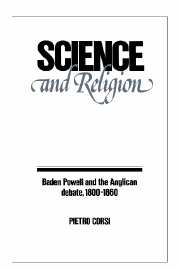Book contents
- Frontmatter
- Contents
- Preface
- List of abbreviations
- PART I
- PART II
- PART III
- The new synthesis and its developments
- 11 The methodology of science
- 12 The Christian apologetic and the fallacies of natural theology
- 13 Christian tolerance
- 14 The parting of the ways: Baden Powell versus Richard Whately
- PART IV
- Bibliography
- Index
14 - The parting of the ways: Baden Powell versus Richard Whately
Published online by Cambridge University Press: 15 December 2009
- Frontmatter
- Contents
- Preface
- List of abbreviations
- PART I
- PART II
- PART III
- The new synthesis and its developments
- 11 The methodology of science
- 12 The Christian apologetic and the fallacies of natural theology
- 13 Christian tolerance
- 14 The parting of the ways: Baden Powell versus Richard Whately
- PART IV
- Bibliography
- Index
Summary
The last mediation
In 1857 Baden Powell published an essay surveying the works submitted to the Burnett Prize Commission, and commented upon current philosophical and theological tendencies in Britain. His attempt at mediating various apologetic proposals put forward by his contemporaries made Baden Powell's reading of their works extremely selective and at times misleading. The difficulty and occasional inconsistency of his later output, as contemporary commentators noticed, mainly derived from his attempt at reconciling intellectual traditions that often reflected opposing philosophical and theological approaches.
Baden Powell's chief goal in 1857 was to show that there was no case for a conflict between science and theology, because there was no common ground between them. This intellectual choice and the actual implementation of it in the 1857 essay were clearly at variance with the thesis put forward in The Connexion of Natural and Divine Truth. The 1838 synthesis presupposed a common ground between science and theology, represented by the natural theology argument. Indeed, since the scriptural evidence of Christianity was increasingly questioned on historical and philosophical grounds, the external evidence provided by the inductive philosopher became the key link of the apologetic exercise. Yet, though desperately needed, the link was clearly a weak one.
The anti-evidential stand taken by representatives of various schools investigating the philosophy of consciousness, as weil as the Millean criticism of the inference from nature to volition, confirmed the general dissatisfaction with natural theology. At the same time, the development of various brands of philosophy of consciousness and religious intuitionism convinced Baden Powell that the fall of natural theology left the fabric of Christian apologetic solidly grounded on the most advanced philosophical principles of the time.
- Type
- Chapter
- Information
- Science and ReligionBaden Powell and the Anglican Debate, 1800–1860, pp. 209 - 224Publisher: Cambridge University PressPrint publication year: 1988

